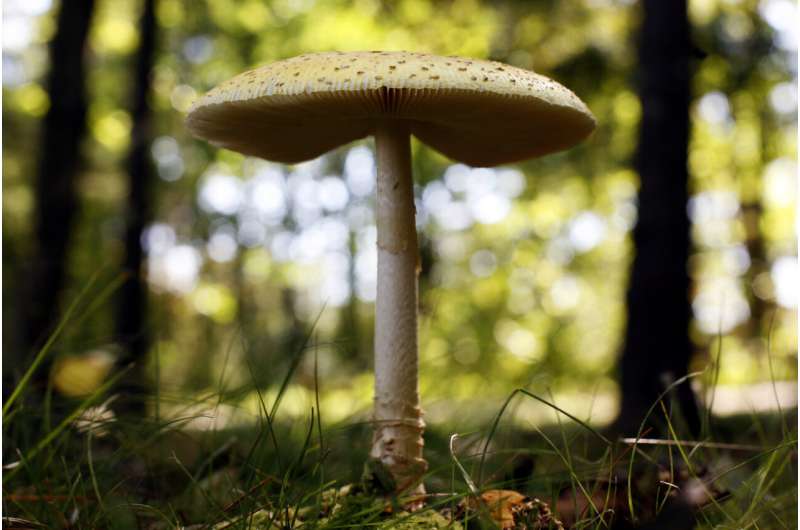This article has been reviewed according to Science X's editorial process and policies. Editors have highlighted the following attributes while ensuring the content's credibility:
fact-checked
reputable news agency
proofread
Midwest sees surge in calls to poison control centers amid bumper crop of wild mushrooms

The warm, soggy summer across much of the Midwest has produced a bumper crop of wild mushrooms—and a surge in calls to poison control centers.
At the Minnesota Regional Poison Center, calls from April through July more than tripled over the same period last year, said Samantha Lee, the center's director. The center took 90 calls for potential exposures over that period, compared to 26 calls for the same months in 2023. Exposures include people who have had actual or suspected contact with potentially poisonous mushrooms and who may or may not develop symptoms, she said.
The cases can include kids who didn't know what they were doing and foragers who make mistakes, she said. But those numbers don't include people who are merely curious about whether the mushrooms popping out of their yards are good to eat.
"Fortunately the majority of the time these tend to be mild symptoms," Lee said. "A lot of these are mushrooms that were in the yard or nearby parks. Many of these cause upset stomachs, vomiting and diarrhea, but every year we do get some cases with serious outcomes."
The situation appears to be similar throughout wetter areas of the country this spring and summer. Kait Brown, clinical managing director of America's Poison Centers, said calls were up 26% across all states and territories for April through June.
"There are probably a couple areas in the country that are experiencing large case volumes that could be related to different weather patterns," Brown said. However, she said her office doesn't have state-by-state data to pinpoint exactly where.
The Minnesota poison center issued a warning this month that wild mushrooms can be hard for untrained people to identify. Common ones that typically cause milder symptoms include the little brown mushrooms that grow in yards and the small white mushrooms that can form "fairy rings," Brown said. But some deadly species also grow in the area, including one popularly known as the "death angel" or "destroying angel." They can cause liver failure.
Foraging for edible wild mushrooms has become increasingly popular in recent years, even before the pandemic, said Peter Martignacco, president of the Minnesota Mycological Society.
"The metro area of Minneapolis-St. Paul itself is having a huge year for mushrooms due to the previous few years of severe drought followed by this year's extremely wet and cool spring, with consistent moisture thereafter," said Tim Clemens, a professional forager and teacher who consults for the Minnesota poison center.
The best way to learn what's safe is to go out with an experienced mushroom hunter, said Martignacco, whose group organizes frequent forays throughout the state. Although there are good guide books, identification apps can be inaccurate and there are guide books generated by artificial intelligence that are "notoriously useless," Clemens said. The misleading information can cause people to make very serious mistakes, he added.
"I'm not sure what motivates them to eat something when you don't know what it is, but some people do that," he said.
© 2024 The Associated Press. All rights reserved. This material may not be published, broadcast, rewritten or redistributed without permission.





















